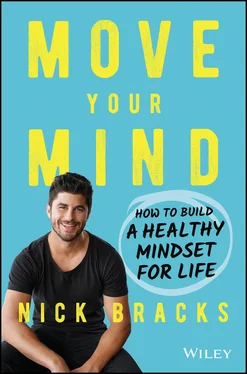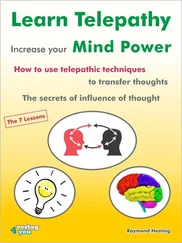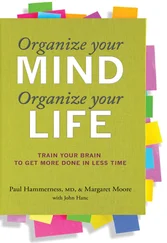Nick Bracks - Move Your Mind
Здесь есть возможность читать онлайн «Nick Bracks - Move Your Mind» — ознакомительный отрывок электронной книги совершенно бесплатно, а после прочтения отрывка купить полную версию. В некоторых случаях можно слушать аудио, скачать через торрент в формате fb2 и присутствует краткое содержание. Жанр: unrecognised, на английском языке. Описание произведения, (предисловие) а так же отзывы посетителей доступны на портале библиотеки ЛибКат.
- Название:Move Your Mind
- Автор:
- Жанр:
- Год:неизвестен
- ISBN:нет данных
- Рейтинг книги:5 / 5. Голосов: 1
-
Избранное:Добавить в избранное
- Отзывы:
-
Ваша оценка:
- 100
- 1
- 2
- 3
- 4
- 5
Move Your Mind: краткое содержание, описание и аннотация
Предлагаем к чтению аннотацию, описание, краткое содержание или предисловие (зависит от того, что написал сам автор книги «Move Your Mind»). Если вы не нашли необходимую информацию о книге — напишите в комментариях, мы постараемся отыскать её.
Move Your Mind
Move Your Mind
Move Your Mind — читать онлайн ознакомительный отрывок
Ниже представлен текст книги, разбитый по страницам. Система сохранения места последней прочитанной страницы, позволяет с удобством читать онлайн бесплатно книгу «Move Your Mind», без необходимости каждый раз заново искать на чём Вы остановились. Поставьте закладку, и сможете в любой момент перейти на страницу, на которой закончили чтение.
Интервал:
Закладка:
Because of my fixation and obsession, I didn't develop socially and isolated myself from other people through my entire high school years (other than close friends I had known throughout my adolescence). I felt even more of an outcast as the level of training was clearly having an impact on my physical development.
By the age of 16, I was yet to hit puberty. I had punished my body to such a degree for so many years that I had stunted my physical development. Among many issues that this caused was a delay in my performance as an athlete. I still got the results, but on the running track and on the football field, I simply couldn't compete with 16-year-olds who had the bodies of men when I was still built like a 12-year-old.
It caused me to distance myself from others throughout my entire high school years, especially girls. I was embarrassed, ashamed and disgusted with myself for not fitting in and developing as I should have. I would pray every night, begging for my body to grow and develop as it should. It was extremely confusing and frustrating. It planted insecurities and stories in my head that I am still undoing to this day.
By the time I finished high school, my body had broken down. My extreme training had caused patella tendonitis, among other knee problems, and I had no other choice than to stop training. I tried everything, obsessively doing hours of rehab each day, but nothing could undo the damage I had done. I remember my sister telling me of the screaming and crying that would come out of my room. It was utter grief and helplessness. My vice had been taken away. The only thing I placed my self-worth on was gone. I wasn't coping and simply didn't see a future if I couldn't be a professional athlete.
By this point in time, to my relief, my body had finally started to grow. I went from being 150 centimetres at 16 and built like a 12-year-old, to nearly 180 centimetres by the time I turned 19. It seems that growth was to come late in all aspects of my life, not only my physical development, which continued into my 20s.
I had also just discovered alcohol around this time. Alcohol gave me the confidence to be myself, speak my mind, interact socially and forget my problems. But unfortunately, this only created bigger problems, as you'll read later.
Realising I had a problem
After high school, I deferred from university and took a gap year. I had no idea what I wanted to do but had been accepted into a double degree of Commerce and Health Promotion at Deakin University. The gap year was a good experience in leaving Australia and experiencing something different, but it was also problematic.
I was incredibly insecure and shy and found it very difficult to interact with others. I would spend a lot of time alone, hiding away trying not to be seen. I was able to travel around a lot of Europe with Huw (who was later in the car crash I talked about in the introduction to the book) and spent a lot of time drinking and using it to mask my discomfort with not knowing how to cope on my own. For the most part, I struggled. Towards the end of the year, my dad had his third election approaching, and due to my struggles, I decided to come home and be there for it.
I started my course at Deakin only to pull out after just six weeks. I was too depressed and couldn't bring myself to try to fit in and meet people. This only led to further alcohol abuse, where I would build my whole week around it. I wasn't working or doing anything else, just counting down the time until I could drink again.
I would be out every Thursday, Friday and Saturday night, and often many other nights, drinking myself into the ground. For me, that same compulsion that I had when it came to competing in sport would kick in. I loved the feeling of escape; I loved the complete freedom my mind gave me to fully express myself, say what I thought and show my personality. I would push myself for no reason other than to outdrink whoever was around me, fuelled by a compulsion that felt illogical but, again, that I couldn't help.
The short-term high of this behaviour would lead to incredible lows. I'd spend the week in bed, locked under the covers, afraid to face the outside world. It also led to life-threatening incidents on a weekly basis. I would wind up passing out in random places, vomiting all over myself, walking down freeways against traffic and making dangerous decisions.
Around that time, I began seeing a psychologist, and also told one of my close friends about what I had been going through. At this point I hadn't told anyone else. I was even too embarrassed to tell my parents how I felt, despite them seeing me fall apart and facilitating the psychologist. I was literally trembling, thinking that my friend would never look at me in the same way again.
But to my surprise it was the complete opposite — she understood, offered emotional support and was there for me. It was a major weight off my shoulders and was the beginning of me eventually talking to more people about it. Importantly, reaching out for the first time instilled in me a key point I regularly speak about now: the importance of having unconditional relationships.
Meanwhile, I was still dealing with issues around drinking and abusing alcohol and had major insecurities and hang-ups from growing up. One of those was around girls. I hadn't been with many girls until the age of 19, when I had my first sexual experience with someone 10 years older than me. It was a relief to have finally had the experience, but due to the social isolation and shame that I felt through my adolescence about not fitting in, I had enormous insecurity about being vulnerable or intimate with girls. I relied on alcohol to interact and turned down opportunity after opportunity to date girls who showed interest in me. I had an irrational fear that I couldn't explain and allowed it to hinder me from having the experience I wanted most: to be in a relationship.
Getting help
For years, I had been suffering and done too little about it. I would come up with every excuse possible to avoid being vulnerable and confronting these issues. I knew that things would not magically get better, but I was afraid of my own shadow and too scared to do anything about it. I was also becoming more self-destructive and didn't see a way out; nor did I want a way out as I felt I had nothing left that I cared about.
It got to a point where I couldn't leave my bed even to do something as simple as walk downstairs and wash the dishes. I was almost catatonic. I couldn't hide the severity of what I was experiencing from my family either, and finally my mum intervened. She dragged me to a psychologist to get the help I so desperately needed. I was now 20 years old.
It was during my first session with the psychologist that I found out I was severely depressed. Even after all I had been through, it still came as a shock. I saw depression as something I was stronger than and thought it was embarrassing for a man to fall victim to such a thing.
But this feeling very quickly turned to relief as I was shown examples of people who had been through similar things and had come out okay at the other end. I began to understand why it was happening to me, to be able to own up to my story and then start to move beyond making plans and begin to make changes.
I found this incredibly liberating. When you're in such a state, often no amount of reasoning or logic will change your mind. You feel so overwhelmed that the thought of facing the future is simply untenable to you. I felt like my life was over and so riddled with emotional pain that no words could describe what it felt like.
Now, it really scares me to think back to those times where I had lost all hope. But equally, I'm thankful that I experienced them and forever grateful I have such a close-knit family and friends who love me. I know now that if I hadn't experienced all of this, I wouldn't be able to develop the same level of empathy for others who were suffering.
Читать дальшеИнтервал:
Закладка:
Похожие книги на «Move Your Mind»
Представляем Вашему вниманию похожие книги на «Move Your Mind» списком для выбора. Мы отобрали схожую по названию и смыслу литературу в надежде предоставить читателям больше вариантов отыскать новые, интересные, ещё непрочитанные произведения.
Обсуждение, отзывы о книге «Move Your Mind» и просто собственные мнения читателей. Оставьте ваши комментарии, напишите, что Вы думаете о произведении, его смысле или главных героях. Укажите что конкретно понравилось, а что нет, и почему Вы так считаете.

![Джон Харгрейв - Mind Hacking [How to Change Your Mind for Good in 21 Days]](/books/404192/dzhon-hargrejv-mind-hacking-how-to-change-your-min-thumb.webp)










